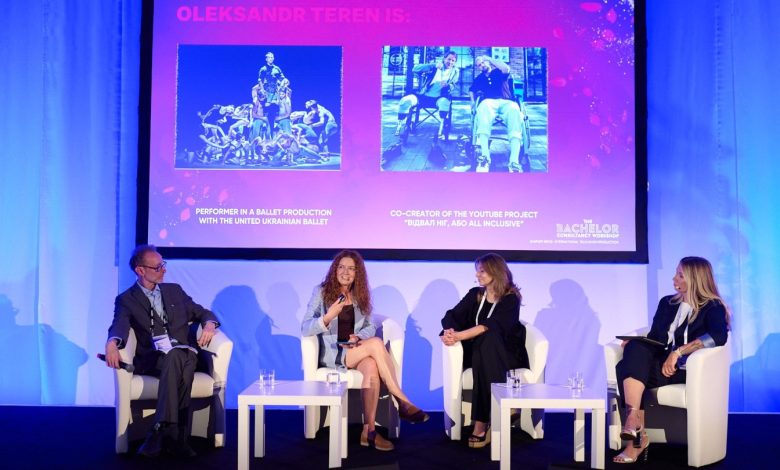How ‘The Bachelor’ Ukraine Has Changed Attitudes Towards Disabled War Vets

With his camera-ready looks and natural charm, Oleksandr “Teren” Budko seemed like a perfect fit to be selected as the man in the spotlight for the most recently aired season of The Bachelor in Ukraine. But there was a twist: Budko is a military veteran who lost both legs during the war that resulted from Russia’s invasion of Ukraine.
Produced by Starlight Media and Warner Bros. International Television and aired on the STB network, the Ukrainian version of The Bachelor has helped change attitudes towards people returning to civilian life after fighting in the war, according to Starlight executives who spoke at NATPE Budapest this week.
“Our mission is to build out the dignity and respect for those who served, because Ukraine is a nation of veterans and their families,” Yana Honcharenko, chief communications and sustainability officer at Starlight said in accepting the first-ever Cause + Action Award as part of the inaugural NATPE Honors Europe in Budapest. The event said the honor was “recognizing Ukraine’s largest broadcasting group for supporting and amplifying the voice of veterans, notably putting a war vet in the spotlight in the most recent edition of The Bachelor.”
Whether it’s comedies, reality shows, documentaries or scripted content, “we will keep telling these stories, because we don’t always know the name of each one of them, but we will make sure the world knows the stories,” Honcharenko vowed. “Thank you and thank you for seeing us, our stories, our people, and our fight.”
Asked how she and her team approach the balance between offering programming with social impact and providing escapist entertainment during a time of war, the executive told THR: “We don’t believe in separating ‘social impact’ from entertainment. In fact, we believe the most powerful change happens when impact is embedded in the mainstream — when it lives inside the content people already love. That’s why, when we address veteran inclusion, we don’t create a single show or campaign. Instead, we integrate it across our entire portfolio: viewers see veterans as contestants on MasterChef, as heroes in our scripted series, as participants in quiz shows and entertainment formats and — yes — also as the lead on The Bachelor. And of course, they are present in our documentaries and news features as well.”
For Starlight, it isn’t just about visibility. “It’s about reflecting the truth,” Honcharenko explained. “Ukraine’s military is incredibly diverse — people of all ages, backgrounds and professions. Some are career soldiers. Others were teachers, chefs, comedians and entrepreneurs. We try to show this full humanity: not just the trauma or scars of war, but the wit, the brilliance, the humor and the talent that veterans bring back into civilian life. Sometimes we’re not telling a story about a soldier — we’re telling a story about someone who makes brilliant desserts, or wants to start a business, or makes people laugh. And that’s just as important.”

Yana Honcharenko, chief communications and sustainability officer at Ukraine’s Starlight Media
Courtesy of vegeldaniel/NATPE Budapest
During a panel discussion at NATPE Budapest, Anna Kalyna, head of the Starlight Production studio, shared some data that shows how having a war veteran looking for love on The Bachelor has changed attitudes in Ukraine.
Starlight made sure to survey attitudes before and after the show aired. Before the most recent season of The Bachelor, 35 percent of people surveyed weren’t sure if a veteran with a disability could be seen as sexually attractive, which fell to 16 percent after the show aired. At the same time, the people who felt they could be sexually attractive rose from 52 percent to 71 percent. Similarly, the percentage of people who didn’t know if such veterans could have an “active, fulfilling intimate life” halved from 26 percent to 13 percent, while the percentage of people who felt they could rose from 68 percent to 79 percent.
Also rising were the percentages of people who said they could imagine someone in their close circle being open to a relationship or family with a disabled war veteran (from 56 percent to 69 percent) and those who said they were willing to watch content featurng disabled war veterans in leading roles (from 82 percent to 90 percent).
“It was probably the biggest and the most amazing impact we have had for our reality TV shows,” Kalyna concluded.
And Starlight expects the impact of the war to have long-term implications. “The most important market trend we’re navigating is the transformation of the audience itself,” Honcharenko told THR. “In Ukraine, the war has reshaped not just the media landscape — it has changed people. Their needs, sensitivities, humor, emotional capacity and attention are all different now. And that requires us to rethink what we offer, how we tell stories, and why.”
Source: Hollywoodreporter
HiCelebNews online magazine publishes interesting content every day in the TV section of the entertainment category. Follow us to read the latest news.
Related Posts
- How Diddy’s Right-Hand Woman Became the Phantom of His Trial
- The Weeknd Kicks Off Sold-Out Four-Night Stand in Los Angeles
- 15 Throwback Photos of Anna Wintour's Iconic Style Evolution
- Bert Kreischer to Topline Netflix Sitcom
- Owen Wilson Rejoins Ben Stiller, Robert De Niro for ‘Meet the Parents 4’ (Exclusive)





